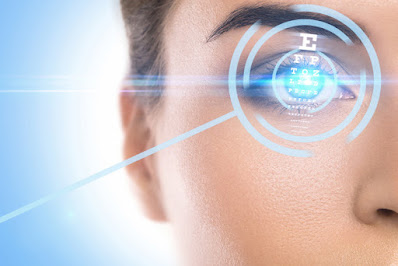Vision correction is any of several techniques required to improve eye problems caused by refractive errors. The eye works by focusing light through the pupil onto the retina – the light-sensitive layer of nerve tissue at the back of the eyes. The retina cells transform light rays into electrical impulses that travel through the optic nerve to the brain.
Refractive errors occur when the shape of the eye prevents light from hitting the retina correctly. The eyes cannot focus on objects properly, leading to blurred or impaired vision. The most common refractive errors are:
● Far-sightedness (hyperopia) – inability to see near objects clearly
● Near-sightedness (myopia) – inability to see close objects clearly
● Astigmatism – irregularly curved cornea leading to distorted vision
● Presbyopia – age-related difficulty in seeing things at arm’s length
If you have refractive errors and think you need vision correction, here are some essential things you may need to know:
Refractive Errors Are Pretty Common
Over 150 million people in the United States live with refractive errors, and many are not aware they could have better vision. Some people never know they have refractive errors until a comprehensive eye exam. The doctor will ask you to read letters far away and near during an eye exam. They may also check for other problems by dilating your pupils with eye drops. The symptoms of refractive errors are:
● Blurred vision
● Double or hazy vision
● Sensitivity to light
● Headaches
● Strained eyes
● Difficulty concentrating when reading or looking at a screen
People with a family history of refractive errors are at higher risk of developing a refractive error. You cannot prevent refractive errors, but you can catch and correct them quickly by going for comprehensive eye checks.
Surgery, Contact Lenses and Eyeglasses Are the Main Ways to Correct Refractive Errors
The vision correction option you opt for will depend on your daily needs, health, lifestyle, and personal preferences. Surgical intervention is ideal for individuals who do not like the idea of wearing glasses or contact lenses and are in good overall health. Vision correction surgeries modify how the eye processes light, providing clearer vision. Some surgery may require replacing your natural lens with an artificial one to correct vision. LASIK is the most common type of vision surgery available. Others include EpiLasik and Photorefractive Keratectomy (PRK).
Contact Lenses
Contact lenses are thin plastic materials placed directly on the eyes to correct refractive errors. Depending on your needs, they may be soft, hard, hybrid, or tori contact lenses. A doctor will prescribe the most suitable contact lens after an eye exam. It is possible to have different contact lens prescriptions for each eye. For sensitive eyes, a gas permeable (GP) or hydrogel lens may be suitable. GP lenses are smaller and do not absorb moisture from your eyes. On the flip side, a soft contact lens made from hydrogel material has unique biocompatibility with the eye making them the ideal fit for sensitive or dry eyes.
Contact lenses rest directly on the eyes, and using them comes with some responsibility. Unsafe use of contact lenses can cause eye infections and vision problems.
Here are some recommended guidelines for the safe use of contact lenses (Source: WebEyeCare):
● Wash and dry your hands before inserting or removing your contacts
● Use fresh, unexpired contact lens solution
● Do not use water, saliva, or any other liquid than the recommended solution for cleaning or storing your lenses
● Replace your lens case every three months
● Do not sleep with your contact lenses
● Do not swim or take a shower with your contact lenses on
Eyeglasses
Eyeglasses are a quick, easy vision correction option. You can put your glasses on or take them off pretty much anytime you want. They rest on the bridge of your nose without making contact with your eyes, and you do not need much care or have to worry about cleaning solutions. They also come in various styles, frames, sizes, and colors.
However, glasses may distort vision, especially for individuals with a strong prescription. Some people may not like the feel or look glasses on their nose or the pressure on their ears. Glasses may also not be great for sports or outdoor activities as the lenses can fog up.
Your Eye Health and Overall Health Are Interlinked
The need for regular eye checks goes beyond seeing clearly. Eyes exams can tell doctors about the general state of your health. Your eyes are connected to blood vessels, nerves, and veins that hold vital health information. An eye check can detect the development or progression of diseases like:
Diabetes
Diabetic retinopathy, a complication of diabetes, can cause blindness and other complications. It damages small blood vessels of light-sensitive tissues in the retina. An early eye exam can detect this condition and reduce the risk of vision loss.
Hypertension
The blood vessels in the eye can also reveal early signs of high blood pressure. Eye doctors often detect hypertension before other health specialists. The information from an eye exam can also provide some insight into an appropriate treatment approach.
Cancer
Doctors can detect cancerous growths during a comprehensive eye check. Brain tumors may also be responsible for loss of peripheral vision or abnormal eye movements.
There Are Different Kinds of Eye Doctors
If you need vision correction, you may need more than one type of expert, and your eye health may depend on knowing who to meet. An optometrist’s duty is to meet your primary vision care needs, including sight testing, diagnosis, management, and treatment of vision problems. Optometrists are not medical doctors. They perform minor surgeries but may be unable to handle complicated cases.
Ophthalmologists are eye doctors who specialize in surgical procedures. They diagnose and manage eye diseases, subspecialties and perform complicated surgeries.
Opticians are technicians who design and fit glass lenses, frames, and other corrective devices. They are not licensed to make diagnoses or write prescriptions.
Final Thoughts
Poor vision can impede your ability to navigate the world and accomplish your daily objectives. Fortunately, there are corrective options to help you see clearly, and it will help if you equip yourself with basic information on vision correction options and what they mean for you.
This is a guest blog entry.























